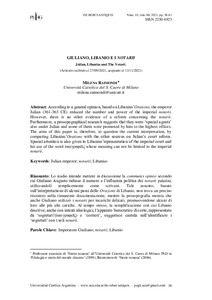Por favor, use este identificador para citar o enlazar este ítem:
https://repositorio.uca.edu.ar/handle/123456789/17280| Campo DC | Valor | Lengua/Idioma |
|---|---|---|
| dc.contributor.author | Raimondi, Milena | es |
| dc.date.accessioned | 2023-10-12T11:55:10Z | - |
| dc.date.available | 2023-10-12T11:55:10Z | - |
| dc.date.issued | 2021 | - |
| dc.identifier.citation | Raimondi, M. Giuliano, Libanio e i notarii [en línea]. De Rebus Antiquis. 2021, 10. Disponible en: https://repositorio.uca.edu.ar/handle/123456789/17280 | es |
| dc.identifier.issn | 2250-4923 | - |
| dc.identifier.uri | https://repositorio.uca.edu.ar/handle/123456789/17280 | - |
| dc.description.abstract | Riassunto: Lo studio intende mettere in discussione la communis opinio secondo cui Giuliano Augusto ridusse il numero e l’influenza politica dei notarii palatini, utilizzandoli semplicemente come scrivani. Tale assunto, basato sull’interpretazione di alcuni passi delle Orazioni di Libanio, non trova un preciso riscontro nella rimanente documentazione, mentre la prosopografia mostra che anche Giuliano utilizzò i notarii per incarichi delicati, promuovendone alcuni di loro alle più alte cariche. Al tempo stesso, la semplificazione con cui Libanio descrive, anche con intenti ideologici, l’apparato burocratico di corte, rappresentato da ‘segretari’(ὑπογραφεῖς) e ‘corrieri’, suggerisce cautela nell’identificare i ‘segretari’ con i soli notarii. | es |
| dc.description.abstract | Abstract: According to a general opinion, based on Libanius’Orations, the emperor Julian (361-363 CE) reduced the number and power of the imperial notarii. However, there is no other evidence of a reform concerning the notarii. Furthermore, a prosopographical research suggests that they were ‘special agents’ also under Julian and some of them were promoted by him to the highest offices. The aims of this paper is, therefore, to question the current interpretation, by comparing Libanius’Orations with the other sources on Julian’s court reform. Special attention is also given to Libanius’representation of the imperial court and his use of the word ὑπογραφεῖς whose meaning can not be limited to the imperial notarii. | es |
| dc.format | application/pdf | es |
| dc.language.iso | ita | es |
| dc.publisher | Pontificia Universidad Católica Argentina. Facultad de Ciencias Sociales. Departamento de Historia. Programa de Estudios Históricos Grecorromanos | es |
| dc.rights | Acceso abierto | * |
| dc.rights.uri | http://creativecommons.org/licenses/by-nc-sa/4.0/ | * |
| dc.source | De Rebus Antiquis. 2021, 10 | es |
| dc.subject | Juliano, Emperador romano, 331-363 | es |
| dc.subject | HISTORIA ANTIGUA | es |
| dc.subject | HISTORIA DE ROMA | es |
| dc.subject | Libanio | es |
| dc.title | Giuliano, Libanio e i notarii | es |
| dc.title | Julian, Libanius and the notarii | es |
| dc.type | Artículo | es |
| uca.disciplina | HISTORIA | es |
| uca.issnrd | 1 | es |
| uca.affiliation | Fil: Raimondi, Milena. Università Cattolica del S. Cuore di Milano; Italia | es |
| uca.version | publishedVersion | es |
| item.fulltext | With Fulltext | - |
| item.languageiso639-1 | it | - |
| item.grantfulltext | open | - |
| Aparece en las colecciones: | DRA - 2021 nro. 10 | |
Ficheros en este ítem:
| Fichero | Descripción | Tamaño | Formato | |
|---|---|---|---|---|
| giuliano-libanio.pdf | 947,67 kB | Adobe PDF |  Visualizar/Abrir |
Visualizaciones de página(s)
26
comprobado en 27-abr-2024
Descarga(s)
12
comprobado en 27-abr-2024
Google ScholarTM
Ver en Google Scholar
Este ítem está sujeto a una Licencia Creative Commons

